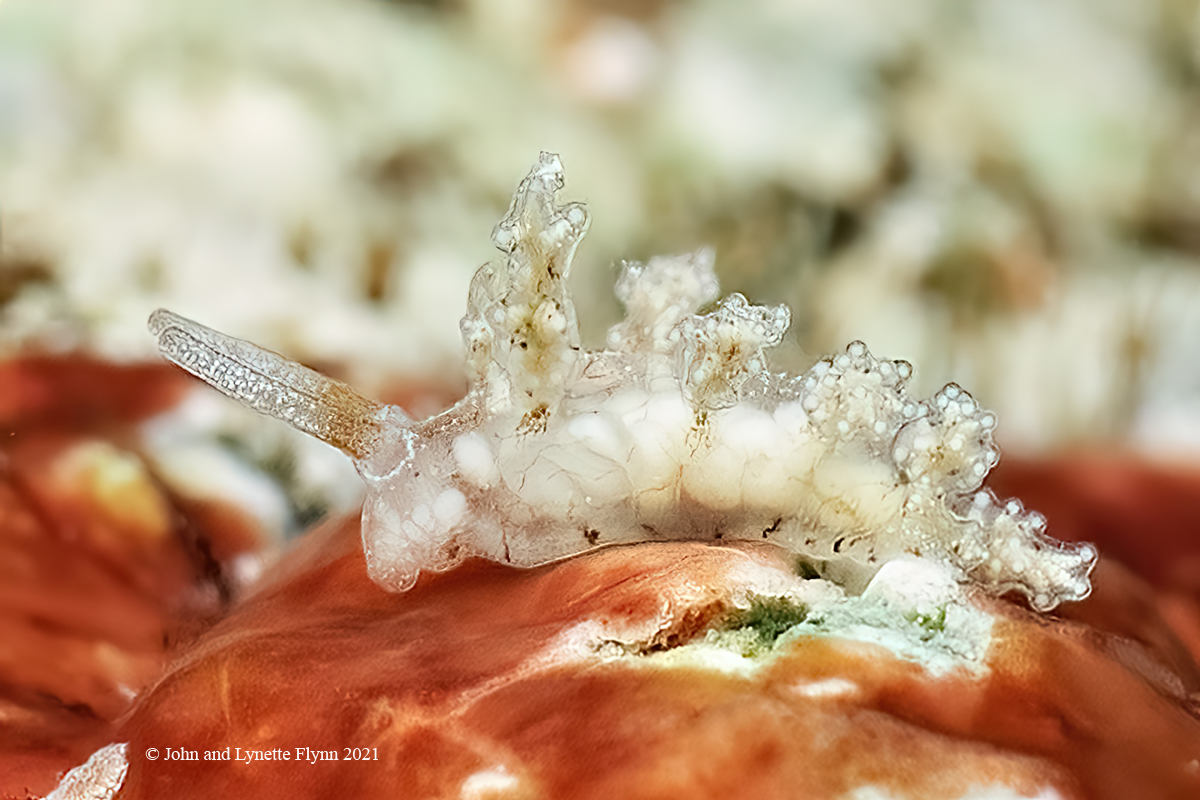 |
Image courtesy of John and Lynette Flynn
Majuro atoll in the Marshall Islands
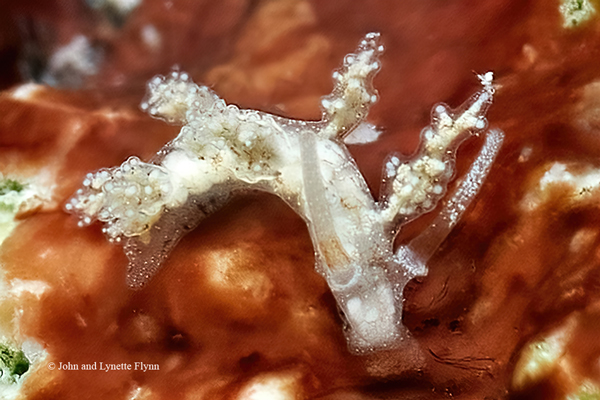
|
Doto sp. (undescribed) Well, they have done it again. How I am not sure. Our citizen scientists, John and Lynette Flynn, floating around Majuro, Marshall Islands, has found another undescribed species. This makes three folks. The Marshall Islands seem to be a pot of gold for undescribed species. Why is this? I tend not to believe that radiation exposure from the atomic bomb testing on the islands has not caused rapid speciation, but instead that John and Lynette's scouring the shallow reef tops (less than 1 m deep), an area rarely frequented by divers, including Scott and Jeanette Johnson, who have dived there for many years, has opened a whole new world for avid branchers. This tiny white Doto looks like nothing we have seen in this part of the world. It has typical Doto rhinophores and irregularly nodulous cerata. The translucent white body is covered with opaque white specks. The cerata have black specks in addition to the white ones. There is a series of black marks along the edge of the foot, and the base of the rhinophoral shaft is reddish brown. John and Lynette's photo also shows a gravid reproductive system in this specimen, soon to lay eggs. This obviously means there were more than one specimen around. Keep up the good work guys! Dave Behrens Sammamish, WA 98074 Oct., 2021 Send Dave email at davidwbehrens@gmail.com |
John and Lynette Flynn at the "clubhouse" of the Rongerik Yacht Club.
Rongerik is an uninhabited atoll in the Marshall Islands and to join the club you have to find some debris on the shore,
put your boat name on it, and hang it in the open air clubhouse.
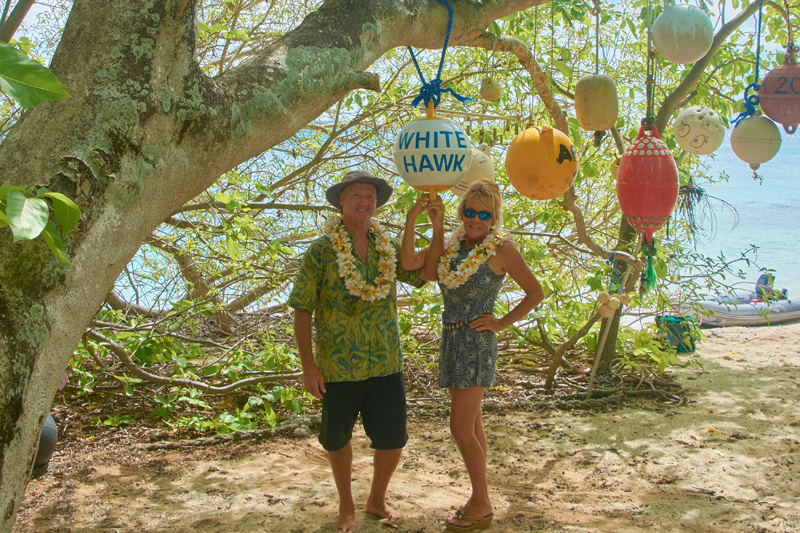
We are John & Lynette Flynn, full time live-aboard cruisers and free-dive photographers who sailed our 46' boat "White Hawk" out of San Diego in 2014 and have been cruising the Pacific ever since. We are currently "stuck" in the Marshall Islands due to COVID border closures, but we have been enjoying our time here hunting Opisthobranchs in shallow water from 0.5 to 5 meters. We are currently shooting with Sony RX100V's in Nauticam housings with CMC-1 wet lenses, SOLA Video Pro lights, and a Sea & Sea YS-D3 strobe. Last year we photographed 51 species of Opisthobranch at Rongelap Atoll, and we are currently at over 100 species of Opisthobranch photographed at Majuro Atoll, including our first-ever discovery of a previously unknown species, a new Unidentia. We still shoot other animals but we are now full-fledged "nudiholics." Our motto is: "If you don't go - you don't know. If you don't look - you don't see."
Send John and Lynette mail at svwhitehawk@yahoo.com |
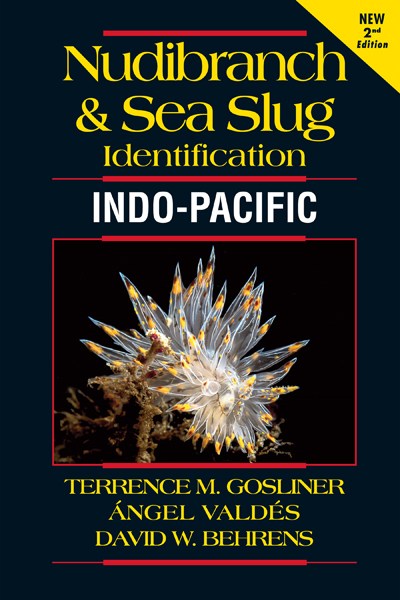
Attention all you Sluggers, and you know who you are! The NSSI 2nd edition is now available in ebook PDF and book form . The hard back version will become available Nov. 1st. Both will cost $65 (individually). You will need to jump through a few hoops to get the electronic version as pdf distribution is protected by Adobe ID!! Please read the following to enable reading your electronic purchase! This new 2nd Edition is updated and reorganized, including 185 new species. Among other features, the new edition includes additional photographs of species, an identification key, and an up-to-date classification reflecting the latest evolutionary relationships. The Indo-Pacific represents the largest expanse of tropical ocean in the world, stretching from the Indian Ocean coast of southern Africa and the Red Sea to the central Pacific of the Hawaiian Islands, Easter Island and the Marquesas. This region supports the most diverse marine fauna of any place in the world for most groups of marine organisms. The nudibranchs and sea slugs are no exception to this rule; there are about 3,000 described species of these organisms in the world and at least 40% of these have been found exclusively in the Indo-Pacific tropics. This book illustrates 2,138 Indo-Pacific nudibranchs and sea slugs, including many undescribed species.
|
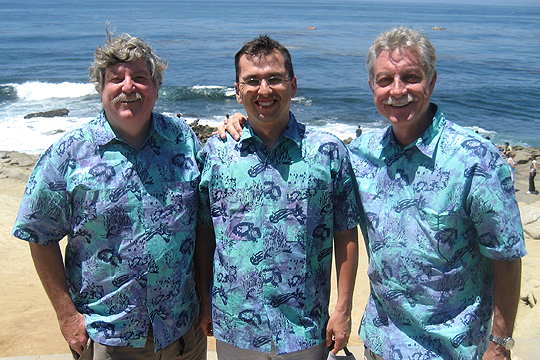
|
